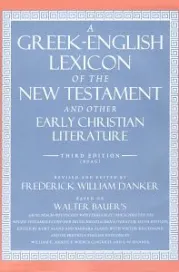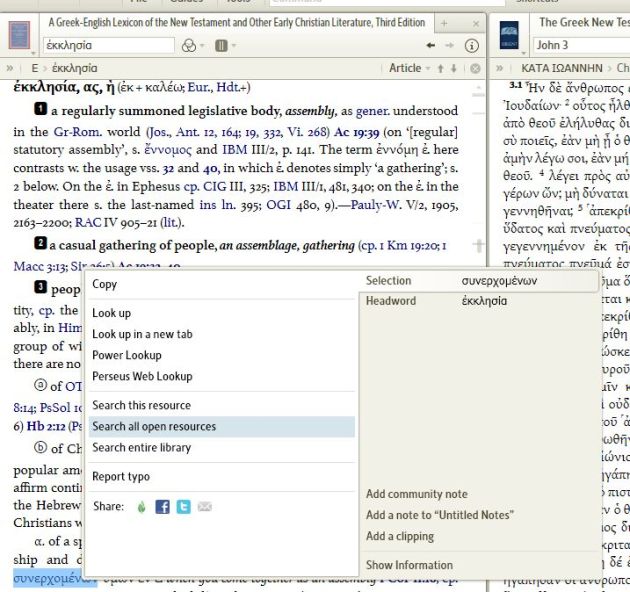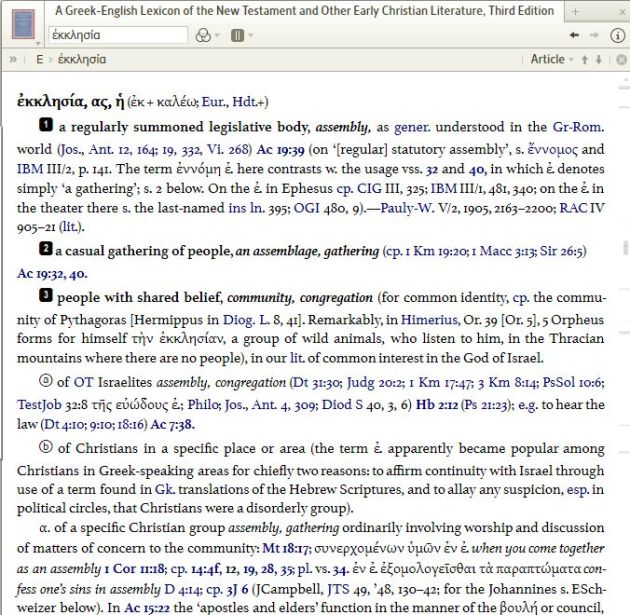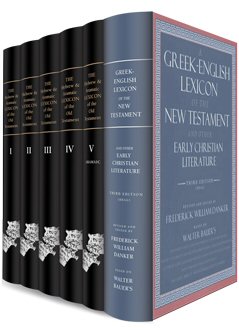 I have owned a hard copy of A Greek-English Lexicon of the New Testament (BDAG) for the last 8 years and it has been an invaluable resource on my shelf. There just isn’t any other lexicon out there with this amount of detail and accuracy. It has been my “go to” resource for Greek studies. I am going to talk about the hard copy and then about what Logos has done with it to take this resource to the next level. Even if you already have the hard copy, I think you will be very interested to see what they have done to make it ever better.
I have owned a hard copy of A Greek-English Lexicon of the New Testament (BDAG) for the last 8 years and it has been an invaluable resource on my shelf. There just isn’t any other lexicon out there with this amount of detail and accuracy. It has been my “go to” resource for Greek studies. I am going to talk about the hard copy and then about what Logos has done with it to take this resource to the next level. Even if you already have the hard copy, I think you will be very interested to see what they have done to make it ever better.
The hard copy retails for right at $100 on amazon. This book contains every single word used in the Greek New Testament listed and defined in alphabetical order along with a whole litany of pertinent information that will assist you in your studies, preaching, teaching, etc. Here is a list of the most common things listed under each entry.
– Formal equivalent/gloss: a word it can be translated with…think of this as single word suggestions that are the English equivalents. Italic font
– Extended definition: a full definition which is more explaining the concept than a word to translate it by. Bold font
– Translation equivalent: often a suggested translation of a given phrase is supplied
– Multiple glosses/definitions as needed for a given word in Greek
– Every NT occurrence of that Greek word categorized under what they interpret it to be the appropriate definition, relevant extra-biblical usage of the word with a citation so you can go look that up, sometimes a Hebrew equivalent is given.
In the Logos version, you get all of the functionality that I just described in addition to some features that make BDAG a whole lot faster to use, much more user friendly and interactive with other Logos resources. Here are some of the things that I thought were extremely helpful.
Outstanding Search Capabilities
One thing that stand out about Logos’ version of BDAG is that it is way more than just a digital/pdf version of the hard copy. There are tools they have included that have increased its functionality and integrated its search features that have saved me countless hours of searching.thate that takes BDAG above and beyond just taking the print version and making it digital.
First, BDAG is fully searchable. You can type in “church” and get any time it appears in the book. But you can get more specific in your search by filtering your search to a selection of any of the following: search by formal equivalent (blood must be in the gloss), search by extended definition (blood is in the conceptual explanation) and/or translation equivalent. This makes it easier to find more common words by having more specific search options. BDAG is over 1100 pages of very small print so this comes in handy. In order to do this, you click the search button at the top of Logos, click “Entire Library” and change that to BDAG. Then click “all text” and check “search fields”. Last, click the down arrow by search fields in order to select the fields you want. It will then look like this and you can check on or off any fields you want to search within
Let’s say you land at “Ekklesia” it would look like this (notice the extended definition in bold, the gloss in italics)
If you rollover any of the scriptures they provide you get the verse. If I rollover Acts 19:39 in definition number 1 here is the result
Now, let’s say you want more information on a Greek word that is in the text. You can search your other resources for that word by right clicking on it and then selecting the search option you want.

In this instance I right clicked the word you see at the bottom left συνερχομενων and then clicked “Search all open resources” which allows me to quickly search BDAG (and in this instance the SBL Greek New Testament since that was open as well) for all other instances of that exact word. Here are the results
Those search results demonstrate another great feature. I had my SBL Greek New Testament open at the same time and as you can see the only time that word is used in the GNT is in 1 Cor 11:18. If you double click the word in the text and it is in its lexical form, say you clicked και or θεος it would take you straight to that entry in BDAG. Then you just use the “back” arrow at the top right of the window to get back where you were in your study.
Integration with other Greek Language products
BDAG integrates with many other Logos products. Let’s say you are reading your SBL Greek New Testament and you want to look up a word in BDAG. You just double click the word and you are on the word in the full text of BDAG. I cannot tell you how helpful that is. What is more, if you download the free Logos App you can do this on the fly away from the office. I was listening to a sermon the other day where three Greek words were mentioned in a specific verse. I got out my iphone, opened the Logos app, pulled up the verse in the Greek NT, clicked the words and had them in BDAG right in front of me. On a side note, you cannot click words that have been transliterated and get the same result. For instance, Ben Witherington almost always transliterates his Greek words so the words aren’t in a Greek font. You cannot click those and end up in BDAG as it is not integrated with transliteration.
I am still playing with the features but have really appreciated what I have found. The thing that will make this interesting to many of you is that I have found this helpful and fast enough that it has renewed the amount of time I spend in the Greek New Testament because I can get to what I need quickly and easily. I want to wrap up the review by thanking Logos for allowing me to have a copy for this review.
This can be purchased from Logos bundled with the 5 volume Hebrew/Aramaic Lexicon of the Old Testament (HALOT) here












